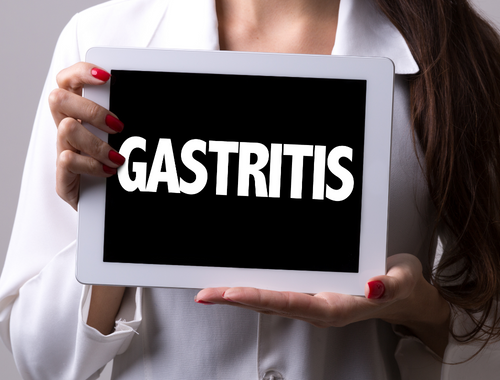Difference Between Gastritis and GERD

What is Gastritis and GERD (Gastroesophageal reflux disease)?
GERD or chronic acid reflux is a medical condition in which the stomach lining is eroded or inflamed. It can occur suddenly or gradually. When stomach acid backflows repeatedly into the tube connecting the esophagus and the mouth, it is called gastroesophageal reflux disease (GERD). Most people experience acid reflux (gastroesophageal reflux disease) from time to time. Heartburn and acid reflux (gastroesophageal reflux disease) that occurs repeatedly can result in GERD.

Similarity
Both gastritis and GERD involve the inflammation of the different parts of the digestive system.
Gastritis
It is redness and inflammation of the stomach’s protective lining. The major causes include use of pain relievers like aspirin, use of excessive alcohol, and some injury.
GERD
In GERD or Gastro-esophageal reflux disease, there is acid leakage from the stomach into the esophagus. The irritation of the esophagus occurs when this liquid backflows repeatedly into the tube connecting your esophagus and mouth.
Difference between Gastritis and GERD
Definition
Gastritis
The term describes a group of conditions characterized by inflammation of the stomach’s lining. The inflammation is usually caused by bacteria responsible for causing stomach ulcers and pain reliever use.
GERD
GERD or acid reflux is a digestive disorder which occurs content of the stomach or the acid flows into the food pipe (esophagus) and irritates the food pipe lining. This irritation results in the inflammation of the food pipe.
Symptoms
Gastritis
- Tummy pain
- Bloating
- Feeling full
- Nausea (feeling sickness)
- indigestion
- Vomiting (Being ill)
- Low appetite
- Farting
- Burping
GERD
- Heartburn (A burning sensation in your chest)
- Bloating and belching
- Bad breath
- Acid reflux
- Esophagitis
- An ongoing cough
- Feeling or being sick
- Upper abdominal or chest pain
- Backwash (regurgitation) of food or sour liquid
- Dysphagia – difficulty in swallowing
- Worsened or new asthma
Causes
Gastritis
There are many causes of gastritis; from bacterial and viral infections to compromised stomach lining caused by nonsteroidal anti-inflammatory drugs like aspirin and ibuprofen. It is common for H. pylori bacteria to infect and spread through saliva, vomit, feces, or contaminated food and water. Smoking, stress, a diet high in bad fat, sugar, and spices, as well as excessive alcohol consumption, are also causes of this disease.
GERD
GERD or acid reflux is caused by weakness or relaxation of the bundle of muscles at the low end of the esophagus (esophageal sphincter (valve)). It is triggered by eating large meals or by eating post dinner time. Also, fatty and fried food items, coffee and alcohol can also trigger GERD. Certain medications such as aspirin can also cause GERD.
Treatment
Gastritis
This condition can be treated with improving bad food habits, getting rid of pomp proton inhibitors, antacids and other risk factors
GERD
Treatment options include – Proton-pump inhibitors (PPIs), nonprescription antacids or histamine receptor antagonists, antidiarrheal medications.
Lifestyle drugs include dietary modifications and weight loss
Summary
The points of difference between Gastritis and GERD have been summarized as below:

FAQ
Can gastritis cause GERD?
Gastritis (inflamed stomach lining) does not cause Gastroesophageal reflux disease (GERD). Though gastritis may co-exist with Gastroesophageal reflux disease (GERD). Helicobacter pylori is a common cause for gastritis, and it does not cause GERD which is acid reflux disease.
How is gastritis and GERD treated?
Antacids and antibiotics are helpful for treating gastritis. Proton-pump inhibitor (reduces acid secretion in stomach) and penicillin (kills and prevents spread of bacteria) and antidiarrheal medications are also helpful.
Treatment for GERD includes – lifestyle and dietary changes, surgery, medication (omeprazole (Prilosec), esomeprazole, pantoprazole (Protonix), rabeprazole (Aciphex), lansoprazole (Prevacid), and dexlansoprazole (Dexilant).
How do they tell if you have gastritis?
In order to ascertain that these are gastritis symptoms, your GP may ask you to do certain tests like: a breath test to check for H. pylori; blood test and a test on your poo.
Can GERD be mistaken for gastritis?
No! Though both GERD and gastritis involve inflammation, the major difference between the two is that GERD is the inflammation in our esophagus and gastritis is the inflammation in your GI tract.
What triggers gastritis?
Gastritis can be caused as a result of infection with the same bacterium. It can also be caused by excessive alcohol consumption, or the use of certain medications such as aspirin
- Difference Between Global Warming and Greenhouse Effect - May 18, 2024
- Difference Between Vaccination and Immunization - March 3, 2024
- Difference Between Selective Mutism and Autism - February 25, 2024
Search DifferenceBetween.net :
Leave a Response
References :
[0]Clarrett, D. M., & Hachem, C. (2018). Gastroesophageal reflux disease (GERD). Missouri medicine, 115(3), 214.
[1]Glickman, J. N., & Antonioli, D. A. (2001). Gastritis. Gastrointestinal endoscopy clinics of North America, 11(4), 717-740.
[2]Katz, P. O., Gerson, L. B., & Vela, M. F. (2013). Guidelines for the diagnosis and management of gastroesophageal reflux disease. Official journal of the American College of Gastroenterology| ACG, 108(3), 308-328.
[3]Sipponen, P., & Maaroos, H. I. (2015). Chronic gastritis. Scandinavian journal of gastroenterology, 50(6), 657-667.
